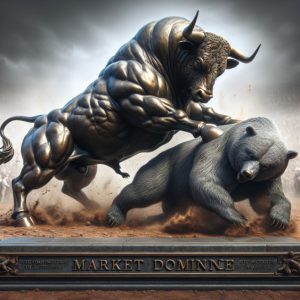
Is Value Investing Dead or Not? Tactical Investor Take
Updated April 16, 2024
Introduction
The debate over the vitality of value investing is as enduring as the strategy itself. Sir John Templeton, a pioneer in the field, would likely argue that the principles of value investing are timeless, emphasizing the importance of seeking undervalued opportunities and maintaining a long-term perspective. He famously looked for bargains in markets at the “point of maximum pessimism,” where others saw despair, Templeton saw an opportunity.
With his keen understanding of market cycles and trader psychology, Paul Tudor Jones might suggest that value investing is never truly dead. Instead, it ebbs and flows with market sentiments and economic conditions. His agility in navigating market trends while keeping an eye on fundamental values aligns with the idea that value investing may evolve but remains relevant.
Drawing wisdom from a brilliant investor, such as Benjamin Franklin, we find that the core tenets of value investing are deeply rooted in the philosophy of seeking intrinsic value and avoiding the herd mentality. Franklin’s adage, “An investment in knowledge pays the best interest,” resonates with the value investor’s creed of thorough research and informed decision-making.
The current bull market may have favoured momentum and growth strategies, but this does not render value investing obsolete. It is essential to discern between a genuine value proposition and a value trap, where a low P/E ratio might mask underlying issues. The integration of mass psychology and technical analysis can unveil actual value, as seen in the case of stocks like WMT, CAT, OXY, etc, which rebounded after being undervalued and overlooked.
In conclusion, value investing is not a relic of the past but a strategy that requires adaptation and insight. The key is to adjust one’s angle of observance, as perspective alters the outlook. Templeton, Jones, and the sagacious Franklin all teach us that value investing is a dynamic discipline that thrives on patience, diversification, and an unyielding search for true worth in a fluctuating market landscape.
Redefining Value Investing: Beyond the Grave or a Golden Opportunity?
Is value investing dead? Is this a million-dollar or just one-dollar question? Don’t bother answering that, for it does not matter. Whenever experts state that something is dead, hated, or disliked, one has to start viewing that sector or strategy more favourably. This bull market has not been kind to value investors, but it has been very gracious to momentum and growth investors. We don’t think value investing is dead, but one should abstain from purchasing a stock because it offers excellent value.
There is a reason that stock has a low P/E ratio, so one has to be careful not to fall for the value investing trap. What is a value investing trap? Buying a stock just because it appears to offer value; many stocks are trading below book value, but they make for a terrible investment. However, by combining Mass psychology with technical analysis, one can find great value plays that make sense. For example, the stock CALM, from July 2016 to roughly July 2017, the stock was in a downtrend, but it started to bottom in July 2017.
The stock was trading in the extremely oversold ranges, the public was shunning it, and it fell under the “value category”. If you purchased the stock anytime on or slightly after July of 2017, you would be sitting on gains of over 30% today. Everything depends on your angle of observance; alter the angle, and the outlook is changed.
Value investing can work if you have a strategy.
Amid the din of expert opinions on value investing, the truth is nuanced. While some herald the death of value investing, others champion its enduring merits. The reality is that value investing may evolve but does not perish. Critics, sometimes as stubborn as mules, may lack the vision to see beyond the current market trends. It’s important to approach their sweeping statements with scepticism.
Philip Fisher celebrated for his investment acumen, encouraged investors to look beyond mere numbers and consider qualitative factors such as management’s quality and a business’s growth potential. He believed these elements could reveal hidden value in companies the market has overlooked. Sir John Templeton, another giant in the field, demonstrated through his global investment approach that finding value is an active, ongoing process that geographic or sector limitations can unbind.
Value investing may have dimmed in the glow of the growth and momentum sectors, but it still possesses the potential for significant returns when combined with a comprehensive strategy. It is not the principle that has faltered but rather the application that must be refined. By integrating mass psychology’s insights and technical analysis’s precision, investors can discern authentic opportunities from the mirages.
CALM shows that a stock that once languished in obscurity can provide tangible returns when assessed with an informed eye. This illustrates that value investing remains a formidable strategy when infused with the proper techniques. The key is to recognize that a value stock’s worth is not solely determined by its current price but by its prospects, as understood through a blend of mass psychology, technical analysis, and fundamental insight—a synergy of approaches championed by investors like Fisher and Templeton.
Resilience of Value Investing: Lessons from Market Crises
Value investing’s resilience, despite periodic declarations of its demise, is evidenced by its performance during times of market distress. The dot-com bubble, the 2008 financial crisis, and the 2020 COVID-19 market crash are critical testaments to value investing principles’ enduring relevance.
Buffett and Graham: Time-Tested Value Strategies Through Market Crises
Warren Buffett, a disciple of Benjamin Graham, is perhaps the most famous proponent of value investing. During the dot-com bubble, Buffett’s refusal to invest in overvalued tech stocks seemed anachronistic to many. However, when the bubble burst, the wisdom of his value-oriented strategy was underscored as Berkshire Hathaway emerged relatively unscathed compared to the significant losses suffered by momentum-driven investors.
Benjamin Graham’s philosophy, which advocates for investing with a margin of safety, became particularly poignant during the 2008 financial crisis. As markets crumbled under the weight of mortgage-backed securities and complex derivatives, Graham’s principles guided value investors to seek out undervalued securities unjustifiably punished in the broad market sell-off. Those who adhered to Graham’s teachings were rewarded as the market eventually recognized the intrinsic value of these assets.
Gustave Le Bon: Crowd Psychology and Market Panics
Gustave Le Bon’s insights into crowd psychology are particularly relevant when examining market crashes. During times of panic, such as the 2020 COVID-19 crash, the mass sell-off behaviour displayed by the market crowd creates a fertile ground for value investors. Le Bon would suggest that in these moments of collective fear, the individual investor, equipped with a value investing approach, can act against the tide, identify mispriced securities, and invest with a long-term view in mind.
In these market crises, the principles of value investing have not only withstood the tests but have also offered a beacon of rationality amidst the chaos. Investors who maintained their focus on the fundamental worth of companies rather than succumbing to the ephemeral sentiments of the crowd were able to capitalize on the market’s eventual return to equilibrium.
The consistent theme across these tumultuous periods is that value investing, far from dead, demonstrates an impressive fortitude, especially when contrasted with speculative strategies that may falter when market conditions sour. This subtopic reinforces the notion that value investing, bolstered by the teachings of Buffett, Graham, and the psychological insights of Le Bon, remains a viable and prudent approach to wealth creation in the face of market adversity.
Words that Resonate: Memorable Articles

Potential of Silver ETF-s: A Wise Investment Choice

USD Dollar Index Investing: A Posh Way to Hedge Against Currency Fluctuations

Are ESOPs Good for Employees? Weighing the Benefits and Risks

Copper ETF: The Great Investment Debate – Buy-In or Miss Out?

Stock Market Psychology Pdf: Mastering the Facts, Not the PDF

What Causes Mob Mentality: Unraveling the Psychology

Cracking Market Cycle Psychology: Navigating the Ups and Downs

Best Silver ETFs: Shining Bright in Your Investment Portfolio

Harnessing the Psychology of a Market Cycle: Thrive in Bull and Bear Markets

ETF Definition: A beginner’s guide to exchange-traded funds

What is a Bull Market Simple Definition: Understanding the Basics of a Thriving Market

Home Mortgage Interest Rates Forecast: Timing is Key

Why is investing in a mutual fund less risky than investing in a particular company’s stock?

Breaking Free: Embracing Early Extreme Retirement

What is a Bull Market? Unleashing its Power
1987 stock market crash anniversary discussions- nothing but rubbish ( Oct 24)


